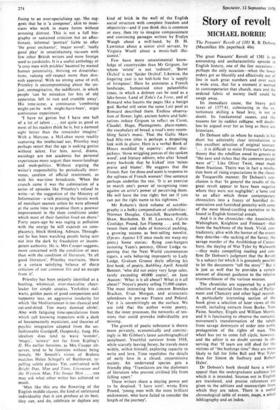Story of revolt
MICHAEL BORRIE
The Peasants' Revolt of 1381 R. B. Dobson (Macmillan 80s paperback 40s) The great Peasants' Revolt of 1381 is an astounding and uncharacteristic episode in English history, one of the few occasions— perhaps the only occasion—when the lower orders got so bloodily and effectively out of line in such great numbers and over such a wide area, that for a moment it seemed to contemporaries that church, state and the ordered fabric of society itself could be swept away.
Its immediate cause, the heavy poll taxes of 1377-81, culminating in the ex- tortionate shilling a head levy, is not in doubt. Its fundamental causes, and the reasons for its sudden collapse, will doubt- less be argued over for as long as there are historians.
Dr Dobson tells us where he stands in his short but admirably clear introduction to this excellent selection of original sources: `... it is difficult to resist Froissart's famous theory that the rebellion owed its genesis to "the ease and riches that the common people were of".' Like Oliver Twist, meat made them fractious. Theirs was in fact a revolu- tion born of rising expectations in the classic de Tocqueville manner. Dr Dobson's con- clusion is that 'In general the results of the greit revolt appear to have been negative where they were not negligible': a-lame end to an affair which threw contemporary chroniclers into a frenzy of horrified de- nunciation and furnished posterity with some of the most blood-curdling narrative to be found in English historical annals.
And it is the chronicles—the Anonimalle. Walsingham, Knighton and Froissart—that form the backbone of the book. Vivid, con- tradictory, alive with the horror of the events they describe—the sacking of the Savoy, the savage murder of the Archbishop of Canter- bury, the slaying of Wat Tyler by Walworth —they make compelling reading and con- firm Dr Dobson's judgment that the Revolt 'is a subject for which it is genuinely possible to let the documents "tell the story".' But it is just as well that he provides a certain amount of discreet guidance to the relative trustworthiness of the various sources.
The chronicles are supported by a good selection of material from the rolls of Parlia- ment and Chancery and other legal records. A particularly interesting section of the book gives a selection of later views of the revolt, including extracts from Burke, Tom Paine, Southey, Engels and William Morris, and it is fascinating to observe the romantic movement's transformation of the rebels from savage destroyers of order into noble protagonists of the rights of man. The wheel has yet to come full circle, however, and the editor is no doubt correbt in ob- serving that 'If tears are still shed for the victims of "the hurlynge time" they are more likely to fall for John Ball and Wat Tyler than for Simon de Sudbury and Robert Hales'.
Dr Dobson's book should have a wider appeal than the undergraduate audience for which it is intended. Sources not in English are translated, and precise references are given to the editions and manuscripts from which they are taken. There is a useful chronological table of events, maps, a select bibliography and an index.














































 Previous page
Previous page